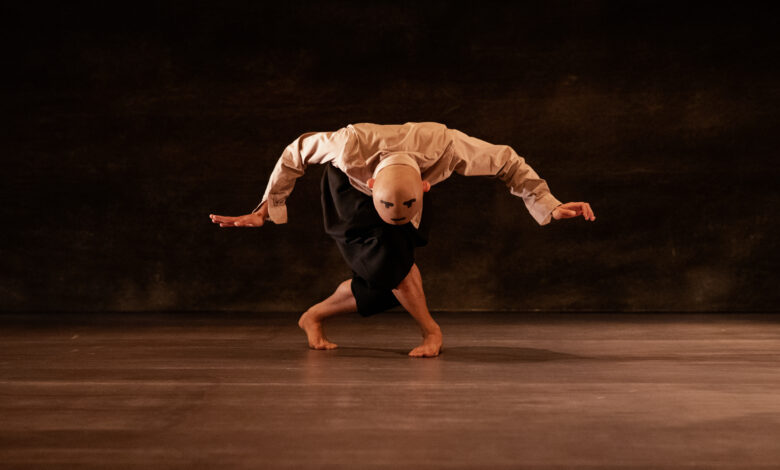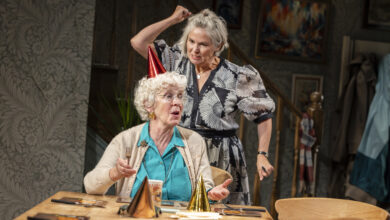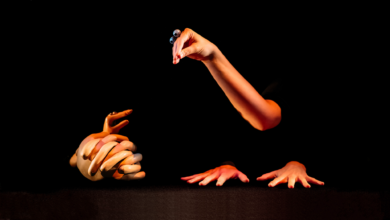A masterful fusion of dance, storytelling and visual artistry that explores identity, family and belonging with heartfelt precision.Rating
Unmissable!
Akram Khan’s Chotto Desh – meaning small homeland – is a rare gem of a work for young people that fuses complex ideas about growing up, masculinity, cultural identity and cross-generational misunderstanding through exquisite choreography, stunning animation and storytelling – all framed by a powerful, emotive soundtrack. First created in 2016, this re-staged production feels entirely alive in 2025, its themes of heritage and individuality resonating just as powerfully today.
Adapted by Sue Buckmaster from Khan’s 2011 Olivier Award-winning solo DESH, the production reshapes the original’s epic scale into an intimate, family-friendly experience for audiences aged 6+. It was performed, on the day I attended, by Nicolas Ricchini, who delivers a tour de force of emotional depth and physical virtuosity. His ability to transform from restless boy to authoritative father, from dreamer to dancer, holds the young audience spellbound.
A series of interwoven scenes charts one boy’s journey towards self-understanding. Call centre conversations open and close the piece: a young voice in Bangladesh greets the adult protagonist, who is struggling to align the calendar on his mobile. These playful, slightly surreal exchanges establish the central question: what connects and divides the worlds of the dancer’s past and present? Then we are in Bangladesh, where, through swift physical transformations, Ricchini becomes a beggar, a traffic policeman, a barking dog – sketching vivid impressions of restless childhood holidays filled with chaos, wonder and heat.
Head puppetry introduces the father, his face painted onto the back of Ricchini’s shaved head; a startling image that captures both intimacy and distance. The relationship between father and son lies at the emotional heart of Chotto Desh: the father’s insistence on discipline, hard work and tradition, and the son’s irrepressible need to move, dance and dream of being what he wants to be. A tiny white chair becomes a recurring motif, representing the boy’s struggle to fit the expectations placed upon him. His refusal to “sit still” becomes a rebellion expressed through cartwheels, spins and desperate bursts of anger.
The grandmother figure arrives as storyteller, her voice guiding a breathtaking animation sequence inspired by The Honey Hunter. Here, the stage transforms into a luminous forest of black-and-white line drawings – a world of rivers, storms and mythical animals. As the story unfolds, we follow the animated boy’s journey through flood and famine, up into a treetop to steal honey from bees while a snake waits below. The movement and animation intertwine seamlessly, the soundscape swelling with delicate vocals that draw us into a fable of survival and courage, mirroring the protagonist’s own search for identity.
Back in the present, the now-teenage son rejects the path his father has mapped out for him, choosing dance over duty. “It’s not your job to live his life for him,” the grandmother advises her exasperated son with tender wisdom. The white chair returns, now enlarged and luminous – a potent symbol of adulthood and autonomy. Through it, Ricchini reclaims control, transforming what once confined him into a vehicle of liberation – a breathtaking sequence of rotating, expansive movement that embodies the freedom he has earned.
Khan’s choreography, blending Kathak and contemporary dance, is full of fluidity and emotional charge. Jocelyn Pook’s haunting score, layered with vocals, ambient sound and rhythmic pulse, binds the elements with cinematic grace, while Tim Yip’s design and YeastCulture’s animation create a world both intimate and infinite. Chotto Desh is remarkable for its seeming simplicity and depth: a story both personal and universal, anchored in autobiography yet reaching far beyond. Beautifully performed and imaginatively realised, it continues to speak urgently to children about the courage to find one’s own path – in a time when divisions are inflamed and diversity is too often seen as a threat, rather than as a source of creative community, cohesion and growth. Go see.
DESH Artistic Direction & Original Choreography: Akram Khan
Chotto Desh Direction & Adaptation: Sue Buckmaster (Theatre-Rites)
Music Composition: Jocelyn Pook
Lighting Design: Guy Hoare
Stories imagined by Karthika Naïr and Akram Khan
Written by Karthika Naïr, Sue Buckmaster and Akram Khan
Assistant Choreographer: Jose Agudo
Rehearsal Director: Amy Butler
Chotto Desh has completed its performances at Sadler’s Wells East
but is touring internationally during 2025/2026








One Comment